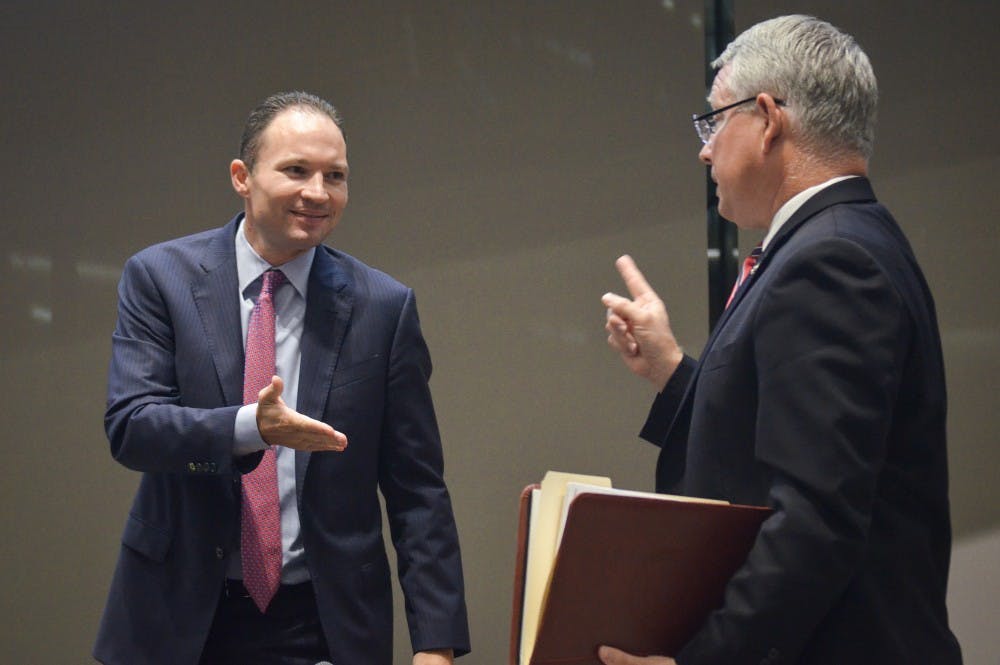In a heated discussion, four panelists at ASU's downtown law school debated the pros and cons of legalizing recreational marijuana — how its repercussions could expand both socially and fiscally if Proposition 205 passes in November.
If passed, the proposition would make marijuana legal for Arizonans age 21 and older. The state is divided on this issue, and the potential repercussions are unclear, with 50 percent in favor according to a Cronkite News poll this month.
“It makes me wonder, when you look at the cost to society of the legalization of alcohol, when we repealed prohibition … do the anti-marijuana people want to go back to 1920?” Jan Grossman, a Scottsdale attorney who attended the forum, said. “They’re all the same arguments from 1919 and before.”
The panel was part of the O'Connor Institute's Issues & Answers Forum series. More than 250 people attended the discussion, which was hosted by Brahm Resnik, a Channel 12 News anchor, at the Sandra Day O’Connor Law School in downtown Phoenix.
The most heated disagreements were between J.P. Holyoak, campaign chairman of the Marijuana Policy Project and Bill Montgomery, the Maricopa County Attorney.
Holyoak of the Marijuana Policy Project argued in favor of Prop. 205, while other panelists argued against or remained neutral.
"We don't think that we need to resort to fear tactics, fear mongering, making things up, the reefer madness days have gone by and simply don't apply today," Holyoak said. "We need to look at our current policies with prohibition ... Do they make sense?"
Montgomery, on the other hand, opposed Prop. 205. He said the bill's language permits the monopolization of the industry by current dispensaries and will result in more young people using marijuana — not just those 21 and older.
"We will see teen-use increase in Arizona, with related issues and use disorders and poor performance in schools," Montgomery said. "Say no to special interests, say no to venture capitalists, say no to Prop. 205."
Everything you should know about the Prop. 205 Marijuana Act from The State Press on Vimeo.
As the night went on, Montgomery and Holyoak's discourse escalated as Holyoak accused Montgomery of being "in bed" with special interest groups. After this altercation, Montgomery refused to shake Holyoak’s hand and left early, missing part of the event.
Ashley Kilroy, who works as the executive director of the marijuana policy for the City of Denver, said in Colorado, where recreational marijuana has been legal since January of 2014, the effects of legalization are hard to measure. She said she has not determined whether or not legalization has positively or negatively effected Coloradans.
Mark Kleiman Ph.D, director of the crime and justice program at New York University, agreed and said he believes if Prop. 205 passes, Arizonans would not feel the effects immediately. He said the legalization would drive marijuana prices down.
"You should start to see the collapse of prices 18 months to two years after stores open and, as it goes down, you'll have more heavy use, which I think is a problem, and you're going to have aggressive marketing," Kleiman said.
Daniel Herder is a first-year law student and said he doesn’t think the proposition will negatively affect the University if it passes.
"I definitely appreciated the forum, I think it brought to light a lot of nuances of the debate that fly past most people” Herder said. “I don’t think that anyone denies that there is marijuana on campus already, so I think (Prop. 205) might just bring more attention to what is happening.”
Emory Caudill is a marijuana advocate and local writer. He debated with Kleiman after the forum ended about the possible effects of Prop. 205. He said he has faced threats from Child Protective Services because of his advocacy for legalizing recreational marijuana.
“Over the last couple years, I have been silent because when Proposition 203 passed, politicians who said they would abide by the people, tore it apart,” said Caudill. “I struggle with chronic pain on a daily basis, and I haven’t consumed cannabis in two years because I don’t want my daughter to be taken away.”
Reach the reporter at Garrison.Murphy@asu.edu or follow @Garrison_Murphy on Twitter.
Like The State Press on Facebook and follow @statepress on Twitter.




